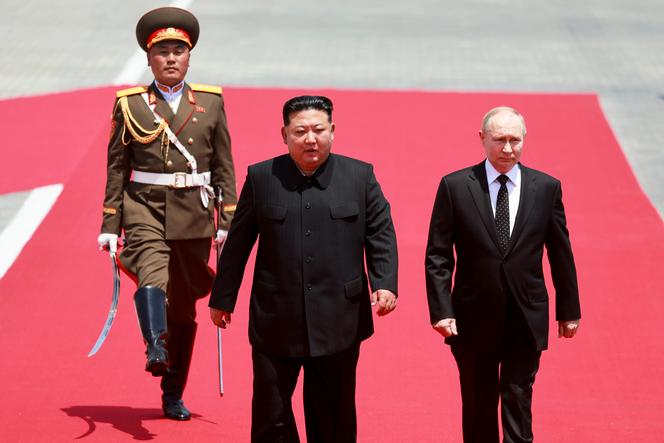


Born of the urgency of the war in Ukraine, the spectacular rapprochement between Russia and North Korea must now be considered in the long term, and in the logic of confrontation between blocs that makes the West a common enemy. This was the message sent by Vladimir Putin's visit to Pyongyang on Wednesday, June 19, where the Russian president was welcomed with exceptional pomp and ceremony.
The main expression of this shared commitment is the unexpected conclusion of a "comprehensive strategic partnership treaty." While the content of this document is secret, its status is in itself superior to previous texts linking the two countries, which date back to 1961, 2000 and 2001. Putin unveiled the most substantial point in a short statement to the press at the end of the official ceremonies: "The treaty (...) provides, among other things, for mutual assistance in the event of aggression against a party to the treaty," said the Russian president. The similar agreement signed in 2019 between Moscow and Mongolia, for example, provides only for "consultations" in the event of aggression.
Putin explicitly linked the conclusion of this treaty to the context of war in Ukraine. Citing the acceleration of Western arms deliveries to Ukraine, including the supply of long-range missiles and combat aircraft, the Kremlin leader said: "In this context, and within the framework of the document we have signed, we do not exclude the development of our military-technical cooperation with the Democratic People's Republic of Korea."
This clarification is probably even more important than mutual defense commitments. Until now, Moscow had never openly mentioned such cooperation, which contravenes UN sanctions and was previously seen as an admission of weakness.
Yet it was the Russian army's urgent need for ammunition that prompted the rapprochement with North Korea, which seized the opportunity to break out of its deep isolation. Deliveries of shells (in calibers and designs compatible with the weapons used by Moscow) are now an open secret. Estimates by American and South Korean intelligence services put the number of shells transported by cargo ship at up to five million, along with dozens of missiles, some of which were identified during the bombardment of Ukrainian cities.
Putin's statements suggest that this cooperation could intensify, or even become institutionalized. Agreements for the joint production of various items of equipment cannot be ruled out either.
You have 70.29% of this article left to read. The rest is for subscribers only.
